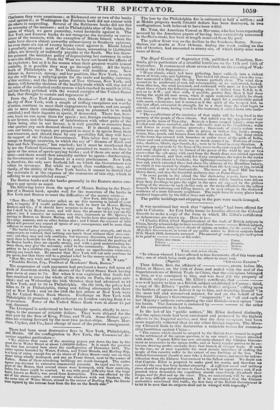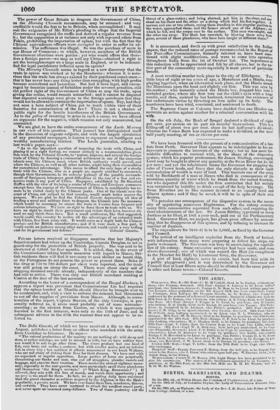It was mentioned last week that "opium scrip" had been
offered for sale in Calcutta. An East India house in London allowed the Colonial Gazette to make a copy of the form in which Mr. Elliot's certificate or debentures are drawn up. Here it is " I Charles Elliot, Chief Superintendent of the trade of British subjects in China, hereby acknowledge to have received front — — British subject, trading in Canton, sixty-seven chests of opium, as under, jig. the service of her Majesty's Gorernment, in terms of my public notice to British subjects dated 27th March 1839, hereunto annexed. The amount of indemnit y jbr said opium
to be paid to — or his order. Thirty-live chests na Fifteen Seventeen Turkey.
Total, sixty-seven chests.
"In witness whereof, I have affirmed to four documents, all of thi,s tenor and: date ; one of which being made good, the others to stand void.
(Signed) "CHARLES ELLIOT."
Then follow, first, the affidavit of — , sworn before Mr. Elliot, at Macao, on tile 15th of June, and sealed with the seal of the Superintendents of British Trade in China, that the said opium belonged to him, or was consigned to him, aud was bond fide the property of a British subject ; second, Mr. Elliot's certificate, that was well known to him as a British subject established at Canton ; third, a copy of Mr. Elliot's "public notice to British snIdeets," calling upon the holders of opium to deliver it up to him, and declaring himself "in the most full and unreserved manner, for and on the behalf of her Britannic Majesty's Government," " responsible " to "all and each of her Majesty's subjects surrendering the said British-owned. opium " into
his bands. The document is endorsed by — to the order of his correspondent in London.
In the last of his " public notices," Mr. Elliot declared distinctly, that the opium-trade had been sanctioned and protected by the highest officers in the Imperial service, and that the ditty in opium had been snore regularly collected than on any other foreign imports. The Morning Chroniek finds in this declaration a sufficient reason for commas.. cing hostilities against China— 'rime course which should be adopted by the British Government in regard to the settlement of the opium question, is in our mind,: no longer attended with doubt. Captain Elliot has now solemnly charged the Chinese Government as accessories to the opium traffic, and as being regular parties to its existence, drawing profits annually from that branch of foreign trade. If such be the case, we at once repudiate the most remote intentioa of making the people of this country suffer to the extent of one farthing of the loss. The British Government should at once take a decisive course, and insist for indent-. nffication from the Chinese Government to the fullest extent. We doubt not that Captain Elliot is prepared to make good his words, and therefore we consider the case free from further obscurity. A sufficient naval and military force should be despatched at once to Ottawa to seek for reparation ; and, if not granted when demanded, the expedition should immediately disembark their troops, and the ,fleet sail up the river. This, we understand, will be an object of no very difficult accomplishment. If it be ascertahled that the Chinese authorities sanctioned this traffic, the first duty of the British Government ift to let it be seen that its subjects shall not be wronged with impunity." The power of Great Britain to dragoon the Government of China, as the Morning Chronicle recommends, may be assumed : and very creditable would the feat to be to Britain, when accomplished l It may suit the exigencies of Mr. Elliot's pleading to allege that the Imperial Government recognized the traffic and derived a regular revenue from it ; but the supposition is at variance not only with repeated edicts from Pekin, prohibiting the importation of opium, but with the fact that the Chinese customhouse .officers were corrupted in order to suffer its admission. The sufferance as illegal. So was the purchase of seats in our House of Commons ; to which, however, members of the British Government aforetime were parties : yet who would affirm that therefore a foreign power—we may as well say China—obtained a right to net the boroughmonger on a large scale in England, or to be indemnified for legal punishment inflicted upon its agents?
The Morning Chronicle seems to regard as a new discovery that the trade in opium was winked at by the Mandarins ; whereas it is notorious that the trade has always existed by their purchased connivance— that it has never been any thing better than smuggling, with high profits because contraband and hazardous. But had it been legal, and encouraged by bounties instead of forbidden under the severest penalties, still the perfect right of the Government of China to stop the trade, upon giving due notice, would remain untouched and it cannot be disputed that repeated warnings were given to the foreign merchants that they would not be allowed to continue the importation of opium. Nay, had they not seen a born subject of China put to death within view of their factories for contravention of the law ? There is not a shadow of public right for the hostile interference of the British Government. As to the policy of resorting to arms in such a cause, we have offered an argument for the negative, which remains not only unanswered, but unassalled.
We are glad, to have the entire concurrence of the Leeds Mercury in oar view of this question. That journal has distinguished itself in the discussion of cognate subjects, and with the largest circulation of any provincial newspaper, is known to represent an intelligent and wealthy manufacturing interest. The Leeds journalist, alluding to kit week's paper, says--
"As to the important question of reopening the trade with China, and placing it on a right thoting, we concur entirely in a recommendation given this week by the colonial Gazette, to restore, improve, and extend the foreign trade of China,' by forming a commercial settlement in one of the numerous islands near the Chinese coast, where British authority would prevail, and where the Chinese, as well as all other nations, might bring their commodities for unrestricted interchange. This seems to affonl the only hope of a steady trade with the Chinese, who as a people are eagerly attached to commerce, though their Government, in its extreme jealousy of the possible encroachments of foreigners, interposes great difficulties in the way of a free and extensive trade in any port of China. Singapore, established by Sir Stamford Baffles with the view of its being a centre of Chinese and European commerce exempt from the caprice of the Government of China, is considerably too re
mote to be visited. easily by the Chinese junks. One of the islands near the coast of China, not subject to that country., would. much better answer the
purpose. We arc glad to find the Calcmial Gazette deprecating all idea of
sending a naval and military force to dragoon the Chinese into the measures which would be necessary to secure the trade at Canton from frequent and serious interruption. We have no right to force them to trade with us. We have no right to insult their government and, violate their laws, however absurd we may think those laws. But a small settlement, like that suggested,
would enable this country to realize all the advantages of an extended trade with China, free from every risk. It would serve as a depot both for Chinese produce and for British manufactures ; and if it were made a free port, it would excite no jealousy among other nations, and would. entail a very trifling cost for its government and defence." Colonial Gazette.



























 Previous page
Previous page